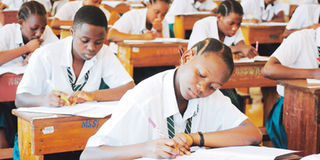Girl education still facing challenges: WB

What you need to know:
- Speaking in an interview with MCL Digital here early this week, Ms Bird who is also the World Bank’s representative to Malawi, Somalia and Burundi, said there were problems in enrolment of girls in schools.
Arusha. Despite huge enrolment in schools, World Bank officials believe there are still challenges facing the education sector in Tanzania, citing the quality of education and early pregnancies for girls.
“The enrolment has improved in the last ten to 15 years, but still there are challenges. The quality is not encouraging,” said the Country World Bank director Bella Bird.
Speaking in an interview with MCL Digital here early this week, Ms Bird who is also the World Bank’s representative to Malawi, Somalia and Burundi, said there were problems in enrolment of girls in schools.
“The numbers have increased but dropping out by girls remains high due to adolescent pregnancies. Girls have to trek long distances to schools,” she said.
She emphasized gender equality in education, saying it underpinned the economic empowerment of women in particular.
Dr Sandie Okoro, the World Bank Senior vice president and Group general counsel in Legal Affairs said access to education and economic resources was not only a challenge facing women in Tanzania but in the entire sub-Saharan Africa.
She said she had visited Tanzania to see efforts being made by the country in addressing the issue, stressing financial inclusion of women through mobile banking as crucial.
She also stressed the need for increased investment in girls and children through health, water supply, renewable energy and nutrition programmes
Dr Okoro, who was here to attend the just-ended International Conference on Gender and Judiciary in Africa, lauded the citizen-centric judicial reform project currently under implementation in Tanzania.
“This is the first time that the World Bank has financed a citizen-centred project such as this in Africa and we have drawn on experiences from other parts of the world”, she said.
The project aims to develop the infrastructure needed to provide a conducive environment in which justice can be dispensed, help build efficient systems for court administration, focussing on transparency “and importantly help develop mobile courts and extend justice to rural areas”.
She said although Tanzania has made “great strides” in addressing constraints impeding on women’s access to justice, challenges remain largely due to gender-based violence (GBV) and inheritance matters.
“Women’s access to justice is often limited by procedural difficultires as well as delays in settling probate matter. Resolving claims claims for small women entrepreneurs in courts can be difficult”, she said.
Speaking in the same interview with MCL Digital, the senior director of World Bank Ms Caren Grown said the Britton Woods institution would soon roll out community-led reforms to support women access justice.
When she opened the conference the Vice President Samia Suluhu Hassan called on the African countries to acess women to justice the same way as men, noting that women were often victims of discrimination, GBV and sexual assaults.
She said the 1999 land legislation was one of the strategies initiated by the government to accommodate women’s rights because it accessed them land in which they had been denied in the past.
The Land Act and the Village Land Act of 1999 also abolished discriminatory customary practices and prescribed women’s representation in the administrative arrangements
Introduction of special police gender desks to improve response to survivors of gender violence and amendment of law through the Sexual Offences Special Provisions Act of 1998 are among the measures to intensify anti-GBV fight.




